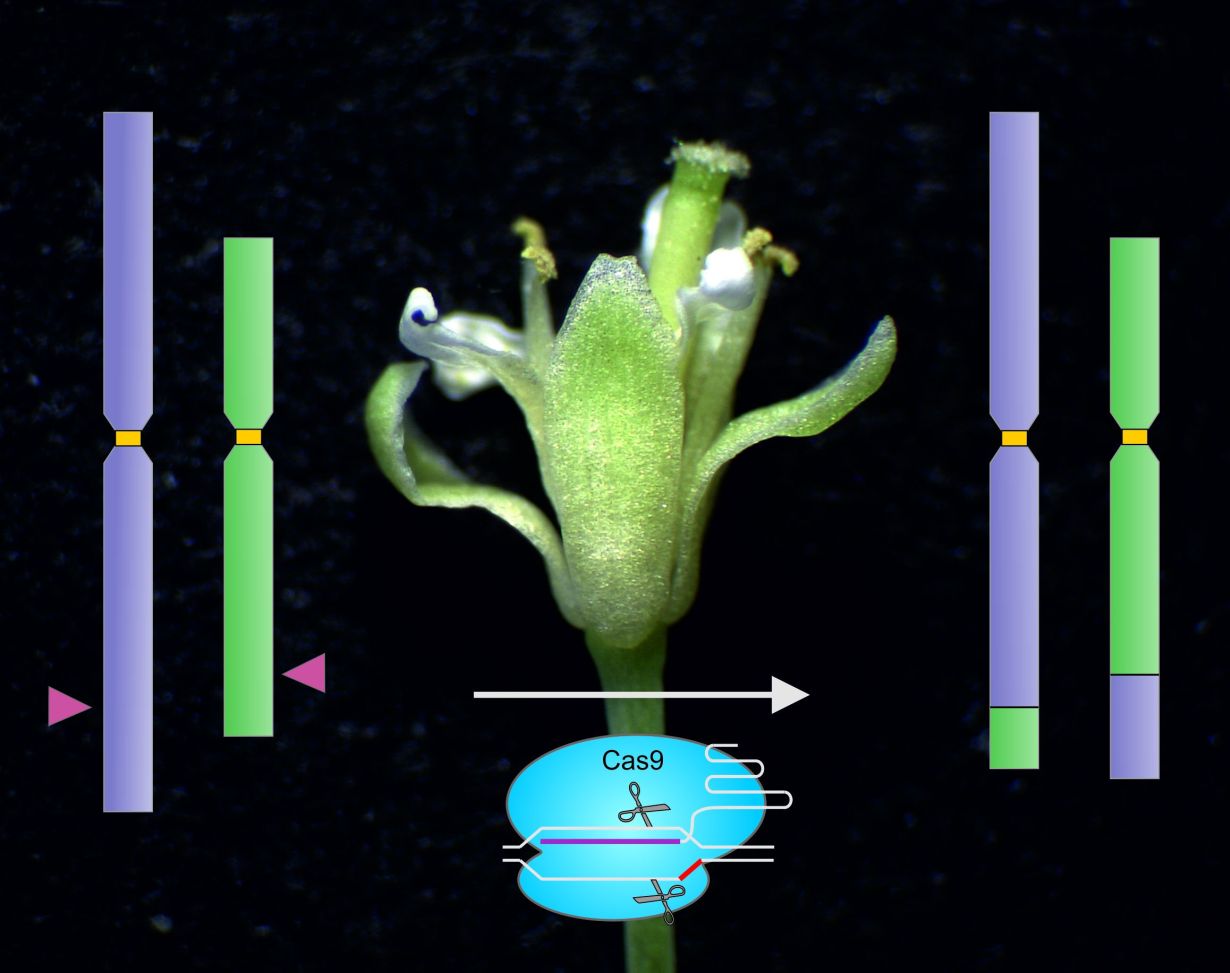The CRISPR/Cas molecular scissors work like a fine surgical instrument and can be used to modify genetic information in plants. The research teams of Professor Holger Puchta of Karlsruhe Institute of Technology (KIT) and Professor Andreas Houben from the Leibniz Institute of Plant Genetics and Crop Plant Research (IPK) in Gatersleben have now been the first to not only exchange single genes, but to recombine entire chromosomes with the CRISPR/Cas technology. In this way, desired properties can be combined in crops. Their work using the thale cress model plant is reported in Nature Plants. (DOI: https://doi.org/10.1038/s41477-020-0663-x)
For thousands of years, humans have taken advantage of the fact that the genetic material of organisms changes by evolution. They cultivate crops that produce high yields, are aromatic or resistant against diseases, pests, and extreme climatic conditions. For this purpose, they choose plants with various favorable properties and crossbreed them. This approach, however, is very time-consuming. Moreover, it is impossible to prevent disadvantageous traits from entering the plants.
Molecular biologist Professor Holger Puchta studies how plants can be cultivated more quickly and more precisely. For his CRISBREED project, he received an Advanced Grant of the European Research Council (ERC) in the amount of EUR 2.5 million. Holger Puchta is considered a pioneer of genome editing. He uses molecular scissors to specifically modify the DNA (deoxyribonucleic acid) that carries the genetic information in crops. With the help of this CRISPR/Cas technology, genes can be removed, inserted, or exchanged easily. CRISPR/Cas stands for a certain section on the DNA (CRISPR – Clustered Regularly Interspaced Short Palindromic Repeats) and an enzyme (Cas) that recognizes this section and cuts the DNA precisely at this point. Crops produced by genome editing do not contain any DNA, which is why they are not to be equated with classical genetically modified organisms.
First Exchange of Arms between Chromosomes
Within CRISBREED, researchers of the Chair for Molecular Biology and Biochemistry of KIT’s Botanical Institute headed by Professor Holger Puchta, in cooperation with Professor Andreas Houben from IPK, Gatersleben, have now achieved first decisive progress in using the molecular CRISPR/Cas scissors: For the first time, they have exchanged arms between chromosomes of the thale cress model plant (Arabidopsis thaliana) with the help of the Cas9 protein originating from the Staphylococcus aureus bacterium. “The genome consists of a certain number of chromosomes, on which the individual genes are arranged in fixed order,” Puchta explains. “So far, CRISPR/Cas has enabled modifications of single genes only. Now, we can modify and recombine entire chromosomes.” These novel chromosomes are then heritable.
The findings presented in Nature Plants promise to result in major advantages for crop cultivation: It is generally difficult to combine positive properties and eliminate negative properties at the same time, because the decisive genes often are arranged in very close proximity on the same chromosome and transmitted together. By the exchange of arms between chromosomes, these properties can now be separated. “We now have the possibility to specifically control the modification of chromosomes and to strengthen or loosen the links between properties,” Puchta explains. “This controlled restructuring of the genome will revolutionize future crop cultivation.”
Original Publication:
Natalja Beying, Carla Schmidt, Michael Pacher, Andreas Houben, and Holger Puchta: CRISPR/Cas9-mediated induction of heritable chromosomal translocations in Arabidopsis. Nature Plants, 2020. (DOI: https://doi.org/10.1038/s41477-020-0663-x)
Abstract at https://www.nature.com/articles/s41477-020-0663-x
Being “The Research University in the Helmholtz Association”, KIT creates and imparts knowledge for the society and the environment. It is the objective to make significant contributions to the global challenges in the fields of energy, mobility, and information. For this, about 10,000 employees cooperate in a broad range of disciplines in natural sciences, engineering sciences, economics, and the humanities and social sciences. KIT prepares its 22,800 students for responsible tasks in society, industry, and science by offering research-based study programs. Innovation efforts at KIT build a bridge between important scientific findings and their application for the benefit of society, economic prosperity, and the preservation of our natural basis of life. KIT is one of the German universities of excellence.

